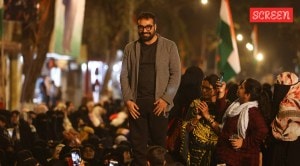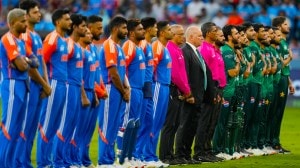Govt works on one voice for Armitage
With two crucial US missions due in New Delhi, starting with Richard Armitage tomorrow, Prime Minister Atal Behari Vajpayee called a brainst...

With two crucial US missions due in New Delhi, starting with Richard Armitage tomorrow, Prime Minister Atal Behari Vajpayee called a brainstorming session with top Cabinet Ministers L K Advani, George Fernandes and Jaswant Singh tonight to evolve a cohesive strategy and cap the contradictory voices emerging from his Government.
Armitage is expected to meet all four leaders during his one-day stay and it was felt that they should speak in one voice so that neither the US nor Pakistan can accuse the Government of internal differences as Musharraf tried to do after the Agra Summit.
|
Pak Foreign Secy Inamul Haq with US Deputy Secy of State Richard Armitage and US ambassador Nancy Powell. Reuters |
The meeting became all the more necessary following George’s statement yesterday, repeated today, that the proposal for joint Indo-Pak patrolling to check infiltration was not workable. A denial had to be issued by the Ministry of External Affairs this evening as it became evident that India was serious about the idea.
In fact, this is one of the key proposals that will be put on the table to Armitage. And the challenge for the Vajpayee Government is not just on the diplomatic front but also to package the idea for the domestic audience, particularly constituents of the Sangh Parivar which have been demanding that India ‘‘do something’’ to teach Pakistan a lesson.
The crux of the proposal is that it will involve a resumption of dialogue with Pakistan, if only at the expert level, to discuss modalities for joint patrolling.
Although India has taken the stand that there can be no talks without an end to cross-border terrorism, PMO circles are of the view that restarting the expert level dialogue, say by the DGMOs, to check infiltration does not imply that India is backing down under pressure.
|
MEA objects but travel
warnings continue |
|
|
• India has taken strong exception to some western nations, including the US, asking their nationals to leave the country, charging them with creating ‘‘needless hysteria’’. Story continues below this ad |
In fact, the official assessment is that the six-month-old strategy of ‘‘coercive diplomacy’’ backed by a military standoff along the Indo-Pak border has achieved what the Agra Summit failed to do. It got Musharraf to admit that Pakistan has been sponsoring terrorism in Jammu and Kashmir and it got him to agree to tackle this issue first, before India and Pakistan get down to discussing Kashmir.
An additional gain has been the international community’s recognition that India has been a victim of Pakistan-backed terrorism in J&K.
These are the points that the Government will have to put across to the hawks in its establishment in the coming days as it puts the next phase of its diplomacy into action once it is convinced that Musharraf has actually delivered on the ground.
Photos




- 01
- 02
- 03
- 04
- 05



























